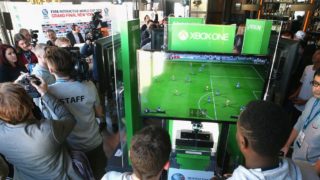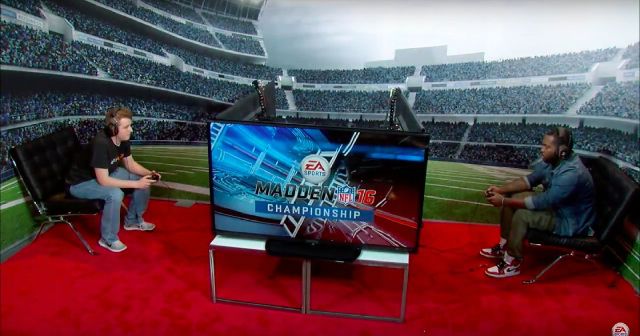Electronic Arts used its EA Play event during E3 to host a Madden Championship, which aired on ESPN2, and is part of the four-tournament $1 million Madden NFL Championship Series. That live event at E3 was part of a multi-eSports offering that also included UFC 2, Need for Speed and FIFA. And EA is just beginning to explore the opportunities of competitive gaming in this golden age of eSports.
EA was early into the eSports game, thanks to its NFL license that made Madden Nation an annual reality eSports show on ESPN2 long before Twitch was launched. With a strong line-up of sports and original games, EA has placed its future of eSports under the guidance of Peter Moore, executive vice president and chief competition officer for Electronic Arts. Moore talks about the role EA’s mainstream sports brands open up for eSports in this exclusive interview from E3.
What are your goals in “officially” stepping into the eSports realm?
We’ve been in eSports and competitive gaming for the best part of 12 to 14 years now, with both the Madden Challenge and the Madden Bowl, and of course the FIFA Interactive World Cup, and in most recent years with our Battlefield games. So we’re not noobs to this whole thing, but it’s time now to really step it up. Forming the competitive gaming division with EA, which I head up, really puts a focus on building it out to scale, taking care of our players, and putting up big prize money so we take care of their commitment to it. And making sure we’re creating formats in which we can really do this 12 months of the year now.
Can you talk about the pyramid and its three tiers?
At the base of the pyramid, there may be as many as 60 or 70 million people who love to play online, love to go to the dorm room in their college and play with their buddies—maybe on weekends, maybe Saturday mornings go to a bigger event. But these people—let’s call them at the amateur level—they’re a part of our Challenger Series. Our goal at EA is to provide tools to these people to have fun web tools so you can do your brackets or your league tournaments.
As we move on up to the middle of the pyramid, it gets a little bit more organized and we’ve got the premier events in which we’ll work with our partners around the world like the ESL and Gfinity and help support them with FIFA, Madden, Battlefield, Need for Speed and UFC, and then build towards the top, which are the EA Majors.
That’s where we will invest heavily, building out major events. That’s where the prize money will be. So you build this aspirational pyramid, but you don’t make it just about the top of the pyramid. You make it all the way up, so you’re building a feeder system, and you’re just providing fun for what is now hundreds of millions of people.

We’ve seen competitive games that have nothing to do with traditional sports explode on PC. What advantage do sports have when you look at the mainstream audience?
It has advantages and it has disadvantages. We have to be able to optimize our games for eSports. We’re not in denial that there’s a lot of work to do. To your point, it’s a PC free-to-play MOBA-dominated environment, and we’re bringing console games that are one-versus-one, for the most part, that are true sports. The plus side of them being true sports is everybody understands the rules of soccer, everybody understands (for the most part) American football, and you can sit and watch it as a spectator event. The flip side is that we’re competing with “the real thing,” and so our goal is to build it out to make real stars of all of the players no matter the skill ability. We used E3 to focus on the top players, people like Serious Moe, Skimbo and Problem, and show how the game is played at the highest level and provide a showcase for people.
ESports has exploded over the last five years thanks to livestreaming, and EA was on ESPN with the Madden Challenge early on and now again with the Madden Championship. What role will traditional television play verses livestreaming?
Livestreaming is where it’s at. Traditional television is coming into ESPN. We’re seeing what TBS is doing with ELeague. There’s not a network that isn’t watching this space very carefully, and here’s why: their demographic, their consumer has retreated to the bedroom. They’re watching the livestreams. They’re then looking at their heroes on YouTube Gaming and video on demand. And “traditional media companies” are looking at this to figure out how they play in this because they need this millennial male and female.
Certainly, ESPN has been a great partner here. They recognize the power of what we’re doing. They recognize the power of our licenses with the NFL in particular, and they want a piece of it, and rightly so. They want a younger demographic. They want to seem to be having their fingers on the pulse of what’s new and exciting, and they want to make sure that they’re preparing themselves for a future where eSports could be on a parallel path with regular sports in regard to the viewership numbers.
EA has done the Madden Bowl at the Super Bowl for many years and this year held a Madden Bowl at the Rookie Challenge. How do those traditional players help spread the word about eSports?
There’s not a player in the NFL that hasn’t played Madden. Many of them will tell you that their goal was to be on the Madden cover as well as playing in the NFL, but the power that Madden has as both a franchise and as a part of mass market culture—27 years of delivering a Madden game—is very important. Our research tells us that if you play Madden you’re smarter, you’re more informed, you’ve got a better grip on strategy, often more than players who actually play the game itself. So it’s a very important part of the culture of the National Football League, the culture of young males and what it teaches them about the game.
The Madden Bowl is a celebration of that, and NFL players want to play in the Madden Bowl. They want to hold up that trophy and say “I’m the best Madden player in the NFL.” And we’ve seen it with Maurice Jones Drew over the years, Marshawn Lynch has given it a go, and Eric Berry of the Kansas City Chiefs was a great story last year. So having these players play it validates it to our fan base. It also shows that this is bigger than just a video game. It really is part of football culture.
When it comes to professional athletes, Rodger Saffold of the LA Rams owns a professional Call of Duty and Overwatch team. We have Shaquille O’Neal, Alex Rodriguez, and Rick Fox who all own League of Legends and CS:GO teams. How do you see that mixture of real sports getting involved in eSports outside of traditional sports like Madden and FIFA bringing validity to video games?
They’ve got a common thread, and that’s competition, teamwork and building together. You can throw Mark Cuban and David Stern in with that list to see the power of what this is. It’s this next generation coming through, looking at “sports” through a different lens than you and I did growing up. They all are intrigued. They’re dipping their toes in the water. They like the idea of ownership. We love the idea that high profile celebrities and athletes are getting involved. I think it’s great for the space.
We’re seeing clubs like West Ham, FC Schalke and Valencia CF invest in eSports. And now we hear that Manchester United is bidding for an Overwatch team as well, so all of this validates the power of what eSports is and gives it some real momentum in the broader space that it’s not just “boys in their bedrooms.” This is big business.

